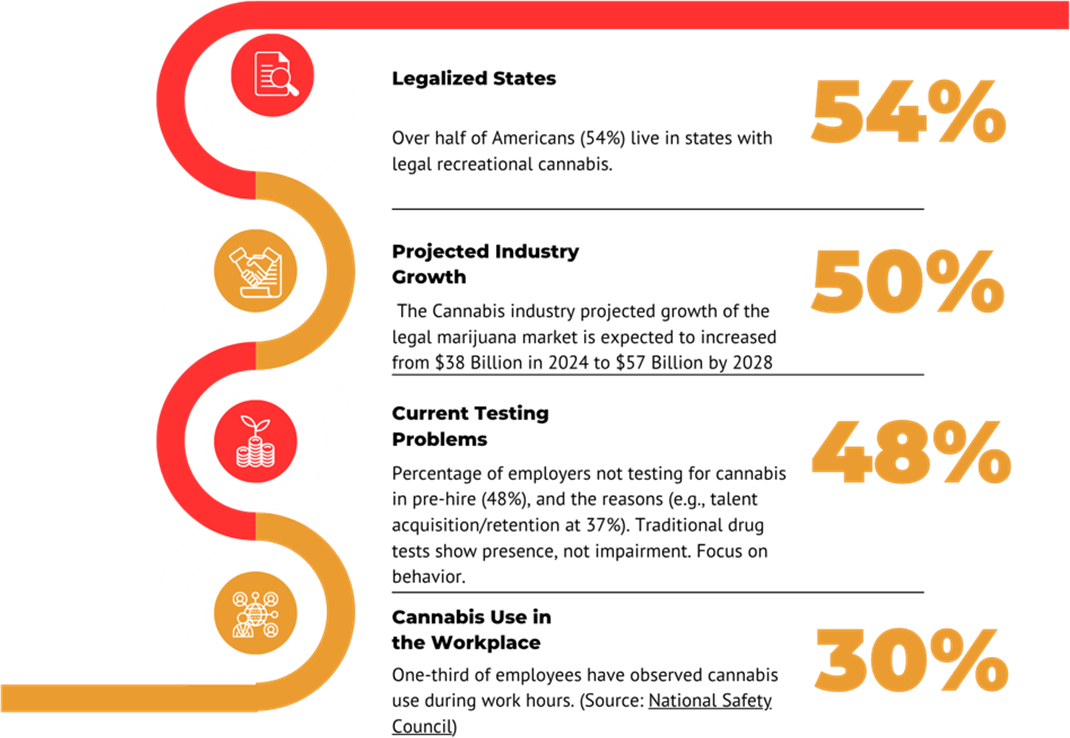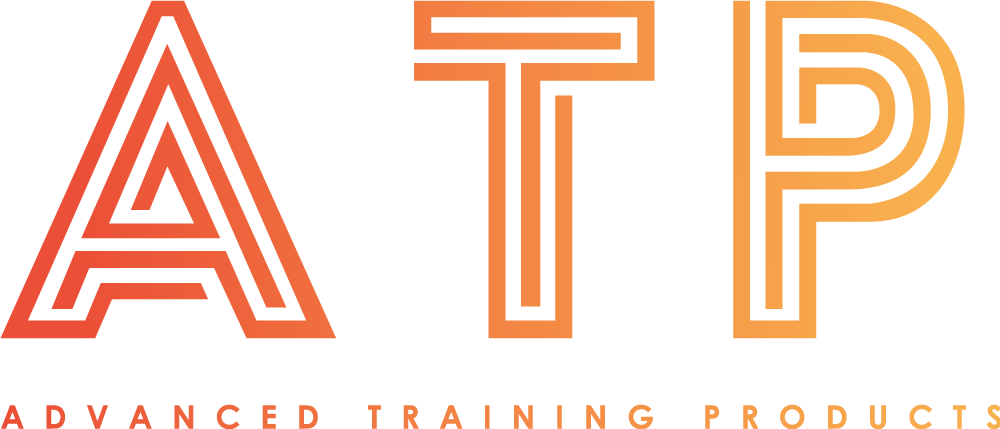White Papers and Press Releases
At Advanced Training Products, we're committed to empowering organizations with the knowledge and tools they need to create safer, healthier workplaces. Our thought leadership resources provide valuable insights into a range of topics, including:
- Total Worker Health® initiatives
- Workplace impairment prevention
- Reasonable suspicion protocols
- Cannabis legalization and its impact on the workplace
Stay informed and stay ahead with our expert analysis and actionable advice.
Keep up with the latest industry news through our press releases below.
Cannabis Legalization and Workplace Safety Balance
The New Normal: Developing Cannabis Policies That Protect Both Employee Rights and Workplace Safety
The way we view cannabis is changing quickly across the United States. What was once widely illegal is now becoming legal for medical or recreational use in many states. This shift creates new challenges for businesses, especially when it comes to balancing employee rights and keeping workplaces safe. Companies must figure out how to handle cannabis use by employees when they are not at work, while still making sure everyone is safe on the job.
Best Practices for Creating Fair, Legally Compliant Cannabis Policies
Developing clear and fair cannabis policies is essential for businesses. Here are some best practices:
- Know the Laws: Policies must align with state and local cannabis laws, which vary for medical and recreational use and employee protections.
- Define and Focus on Impairment: Cannabis stays in the system long after use. Policies should target observable signs of impairment at work, not just past off-duty use shown by a drug test.
- Define Impairment: Clearly state what workplace impairment means (e.g., behaviour changes, poor judgment, slow reactions, safety risks). Train managers to spot these signs.
- Review Drug Testing: Re-evaluate drug testing methods. Many employers skip pre-employment cannabis tests, especially where legal. Post-accident or suspicion-based testing should rely on clear impairment signs.
- Communicate Clearly: Employees must understand the company's cannabis policy, including what's allowed, what's not, and the consequences for violations.
(Howard, MD, Chosewood MD, Jackson-Lee MPH, & Osbourne MPH, CHES, 2020)
Case Studies: Balancing Employee Privacy with Safety Requirements
While specific company names are often not publicly shared in detail for their cannabis policies, general approaches show how some businesses are finding a balance:
- Focusing on Performance: Instead of random drug tests for all employees, some companies are shifting to a performance-based approach. If an employee's work quality drops or they show signs of impairment, that triggers a conversation and potential testing for impairment, regardless of the substance. This respects off-duty privacy while addressing workplace safety.
- Medical Accommodation: Companies in states with medical cannabis laws are learning to treat medical cannabis use similarly to other prescribed medications. This means engaging in a discussion about reasonable accommodations, ensuring the employee can perform their job safely, and adhering to privacy laws like the Americans with Disabilities Act (ADA). Some states, like Arizona and Delaware, have laws that prevent employers from taking action against an employee solely for participating in a medical marijuana program. (Liquori, 2016)
- Clear "No On-Duty Use" Rules: Even in states where recreational cannabis is legal, employers maintain the right to prohibit its use, possession, or being under the influence of cannabis on company property or during work hours. This is similar to alcohol policies.
LEGAL LANDSCAPE
As of May 2024, 38 states and Washington D.C. have made medical marijuana legal, and 24 states and Washington D.C. allow recreational adult use. (D'Souza, 2025)
A large number of Americans now live where cannabis is legal in some form. For example, over half of Americans (54%) lived in a state where recreational marijuana use is legal as of 2024. (Schaeffer, 2025)
EMPLOYMENT LAW
- Many states are passing laws that protect employees who use cannabis legally outside of work hours, especially for medical reasons.
- Some states limit an employer's right to test for cannabis in pre-employment screenings.
- Nearly half (48%) of employers do not test for cannabis in the pre-hire process.
- 37% of those who don't test cite talent acquisition and retention as key reasons.
(Insights, 2024)
TIPS TO RECOGNIZE IMPAIRMENT
Observable Behavior: Managers should document specific, observable behaviors that suggest impairment, that can include:
- Difficulty concentrating or remembering things.
- Slowed reactions or poor coordination.
- Unusual drowsiness or agitation.
- Slurred speech or bloodshot eyes.
- Carelessness leading to accidents or near-misses.
Context Matters: Consider the employee's role.
- A safety-sensitive position (e.g., operating heavy machinery) will have a lower tolerance for any potential impairment than an office-based role.
Testing for Recent Use/Impairment:
- While traditional urine tests show past use, newer methods like oral fluid tests or blood tests can indicate more recent use.
- Tests don't perfectly measure impairment levels like a Breathalyzer for alcohol.
- Plasma THC levels are considered the most accurate for recent use and correlation with impairment.
(Hazle, Hill, & Westreich, 2022)
Consistent Application: Whatever framework a company uses must be applied consistently to all employees to avoid claims of discrimination.

Works Cited
Cannabis and Safety: It's Complicated. (n.d.). Retrieved from National Safety Council: https://www.nsc.org/workplace/safety-topics/drugs-at-work/cannabis-its-complicated
D'Souza, D. (2025, February 06). The Future of the Marijuana Industry in America. Retrieved from Investopedia: https://www.investopedia.com/articles/investing/111015/future-marijuana-industry-america.asp
Hazle, M. C., Hill, K. P., & Westreich, L. M. (2022, February 10). Workplace Cannabis Policies: A Moving Target. Retrieved from National Library of Medicine: https://pmc.ncbi.nlm.nih.gov/articles/PMC8864412/
Howard, MD, J., Chosewood MD, L., Jackson-Lee MPH, L., & Osbourne MPH, CHES, J. (2020, June 15). Cannabis and Work: Implications, Impairment, and the Need for Further Research. Retrieved from NIOSH Science Blog: https://blogs.cdc.gov/niosh-science-blog/2020/06/15/cannabis-and-work/
Insights. (2024, October 08). FP Flash Survey Reveals Half of Employers Don't Test Applicants for Cannabis: 7 Biggest Employer Takeaways. Retrieved from Fisher Phillips: https://www.fisherphillips.com/en/news-insights/fp-flash-survey-reveals-half-dont-test-applicants-for-cannabis.html
Liquori, F. (2016, May 16). The Effects of Marijuana Legalization on Employment Law. Retrieved from National Association of Attorneys General: https://www.naag.org/attorney-general-journal/the-effects-of-marijuana-legalization-on-employment-law/
Schaeffer, A. J. (2025, July 08). 9 facts about Americans and marijuana. Retrieved from Pew Research Center: https://www.pewresearch.org/short-reads/2025/07/08/facts-about-marijuana/

